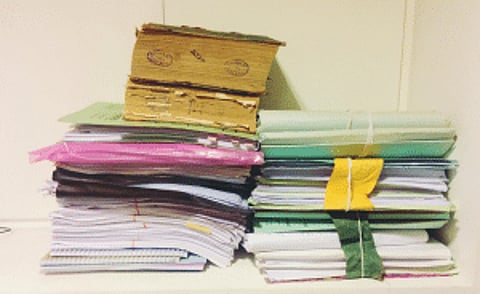
- Latest Legal News
- News
- Dealstreet
- Viewpoint
- Columns
- Interviews
- Law School
- Legal Jobs
- हिंदी
- ಕನ್ನಡ

After almost a quarter of a century in litigation, I’ve noticed one stark change in recent times - the increased verbosity of pleadings and the sheer volume of documents.
I recollect that legal notices used to be a page or two long, complaints spanned about 5 or 6 pages and even a complex writ petition/plaint was a tad longer, at about 40-50 pages. Intellectual giants advanced profound and thought-provoking court arguments in quiet yet stately tones. Equally placed stalwarts on the Bench rendered judgment, commensurate in nature and size to the arguments made and assistance received.
We are in different times now. I was made aware of a matter where parties have filed 22 “convenience” volumes. That’s right. 22. For convenience. Verbose matters then lead to prolonged hearings and multiple adjournments. Counsel and judge wade through and deal with everything filed and argued. A judgment with a table of contents was earlier unheard of. Now, one is not surprised to see one. And yet, loose ends remain leading to further litigation. Impossibly long cause lists where matters don’t reach and piling judicial arrears are the “order” of the day.
One may say that matters today have become complex, requiring a detailed “de-layering” to make issues understood. But any arguing counsel will tell you that most matters usually revolve around two or three points, a one-page note and ten or twelve solid documents. Besides, the courts have always been grappling with issues, complex or otherwise. Leaving aside locus classicus like Kesavananda Bharati (or the like), pick up any law journal pre 1990 and you will see some weighty legal issues, tidily dealt with and disposed. The same journal would also reveal that the Supreme Court had time to render a three-judge verdict on a distraught Babulal’s 1/4th share in ancestral agricultural land in some corner of remote India.
So, let us question the beginning of this process. Why can’t advocates on record/filing counsel practice precision filing at the start of the matter? Precise pleadings would invite pointed arguments leading to quick hearings and pithy judgments. Yet, this is not so.
I have concluded that the answer is time. Sifting through client files for the right document, building a refined case structure, reading up the applicable law and formulating précis pleadings demands phenomenal amounts of time for focused reading and quiet analysis. This is a luxury young counsel today are either deprived of or simply do not think it feasible to avail of.
Fiercely competitive work procurement landscapes, clients who expect quick turnarounds, crushing office deadlines and the burden of grappling with other similarly styled voluminous matters, places everyone, especially junior and filing counsel, on an impossible timeline. Resultantly, client letters, emails and comments (even if not relevant) are quickly repackaged as pleadings. Documents are wholesale annexed “just to be sure” nothing critical is left out. E-filing is deployed to dump-file 20,000 pages (or multiples thereof). LiquidText is relied on to ink-link case volumes that would be inconceivable to carry around physically.
Ills plague not just the juniors. Barring a few, seniors who would earlier consider it their solemn duty to groom the next generation of lawyers now rarely have the time (or the inclination) to do so. They themselves are victims of bulky pdf files transmitted over WhatsApp or email after the urgent list is released. Conferences are a 30-to-60-minute rendezvous on VC or Facetime. All in all, a high premium is placed on speed and numbers. Refined content is irrelevant. And life goes on.
I think it is time for us to pause and re-calibrate. Let us start appreciating focused thought and not empty flurried activity. Create an impetus for ourselves as well as our juniors and teams to read, think, query, formulate case strategy and structure propositions of law. Re-introduce old habits - to draft, re-draft, revise and refine. We would not only be nurturing inquiring minds in our juniors, but also augmenting our own. Yes, all of this takes time. But it yields a beautiful gift - perfection- or at least as near to it as a human being can achieve.
It’s not just our profession which would also benefit, the law would too. True jurisprudence would evolve, not struggling in this crowd of documents but rising above this cacophony of words like the beacon of light it was meant to be. A case responsibly argued would birth a judicial order binding society in the right reason of the law. Courts would be freed up, not just to engage in high stakes litigation, but also have the measure of time to deal with the common man’s tribulations.
Suggesting that through careful observation and contemplation, one can grasp even the vastness of the universe and the endless nature of time, within small and everyday things, I end with a quote from William Blake’s The Auguries of Innocence:
To see a world in a grain of sand,
And heaven in a wild flower,
To hold infinity in the palm of your hand,
And eternity in an hour.
Rameeza Hakeem is the former Additional Advocate General, Punjab and is currently a litigation counsel practising before the Supreme Court and High Courts.